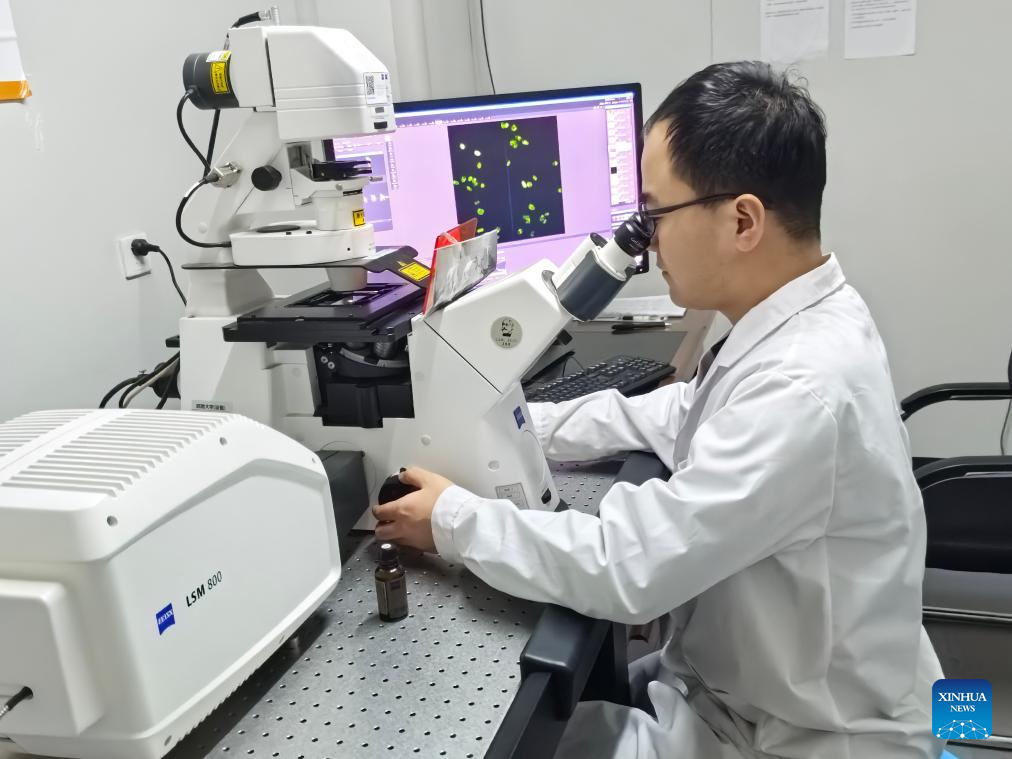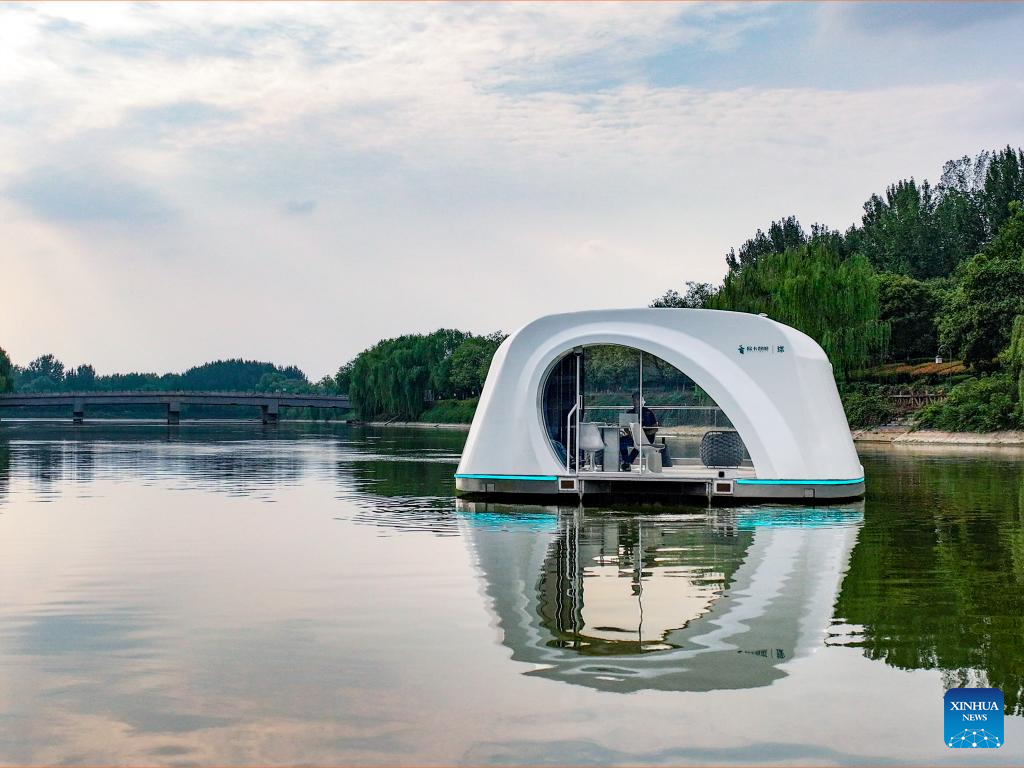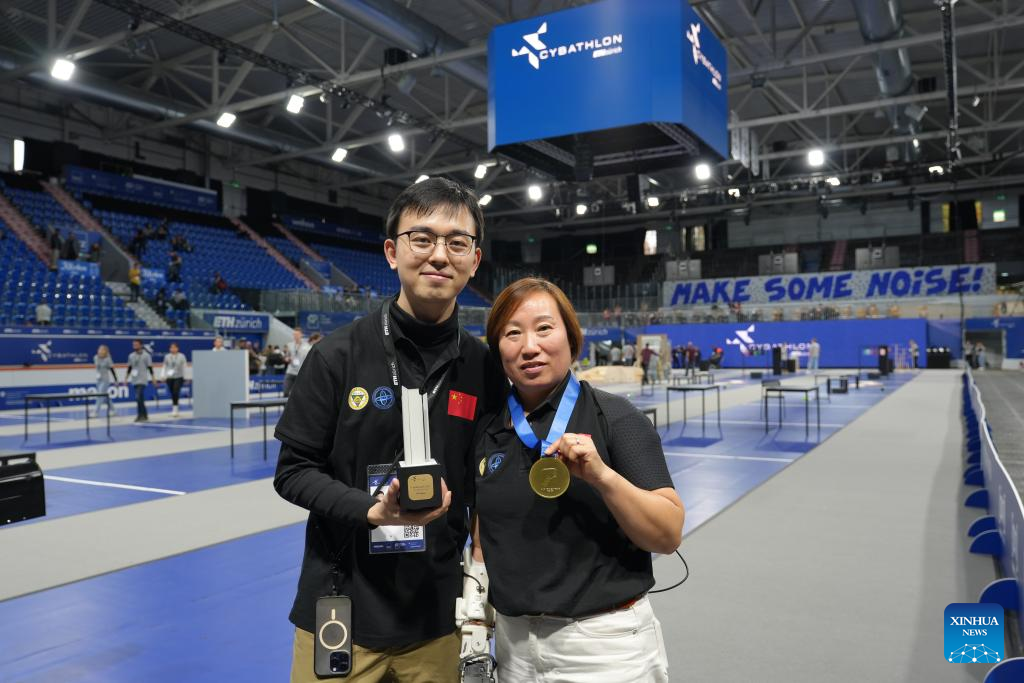Feature: Young innovators breathe fresh life into China's tech scene
Source: Xinhua
Editor: huaxia
2025-01-16 14:45:30

This photo taken with a mobile phone shows Chen Xinlong observing the expression of potato proteins through a microscope at Southwest University in southwest China's Chongqing Municipality, Jan. 16, 2025. (Chen Xinlong/Handout via Xinhua)
Editor's note: Young people are often seen as the driving force for renewal and growth. As 2025 begins, Xinhua presents a series of five stories exploring the passions and pursuits of young Chinese, from the perspectives of consumption, careers, culture, innovation and lifestyle, discovering how they are reshaping the country's future trajectory. This is the fourth piece on their inspiring journey.
by Xinhua writers Zhang Dan, Liu Yiwei and Li Yilin
BEIJING, Jan. 16 (Xinhua) -- In a rapidly advancing world, a new wave of Chinese innovators are pushing the boundaries of science and technology. These pioneers are not just imagining the future -- they're making it happen.
Chen Xinlong, 33, has spent his life chasing a bold vision: revolutionizing farming through science and technology. Now, in the bustling municipality of Chongqing in southwest China, his lifelong aspirations have taken root.
Inspired by Yuan Longping, the "father of hybrid rice," Chen has achieved remarkable results in rice breeding and potato disease resistance by skillfully integrating advanced technologies into his research.
While studying genetics at Southwest University, Chen found the plant DNA extraction process slow and cumbersome, with some reagents being toxic and corrosive. This inspired him to develop a safer, more efficient method.
Later he developed a "magical toolbox," a biological breeding toolbox which contains a variety of biological breeding tools and kits for gene editing and transgenic technology, allowing for precise gene manipulation and significantly shortening the breeding cycle.
"It's like a car repair toolkit for 'fixing plants'." Chen explains, "Tasks that once took four or five students a whole day can now be completed in minutes."
Chen is among a new-generation of scientists driving China's scientific exploration and innovation.
Yin Hejun, minister of science and technology, once noted that many leading teams in major sci-tech missions, such as the BeiDou Navigation Satellite System and lunar exploration programs, have an average age in their thirties.
"Young people are the most creative and have the greatest potential for innovation," Yin emphasized, recognizing their crucial role in propelling China toward its goals of high-quality development and modernization.
MAGICAL TOOLBOX
Chen later joined the Integrative Science Center of Germplasm Creation in Western China (CHONGQING) Science City, and is currently focused on combating late blight, a devastating disease that threatens potato crops globally.
Late blight has posed a relentless challenge to scientists due to the rapid mutation of its pathogen. A discovery by Chen's team, which uncovered key regulatory mechanisms, would lay the foundation for developing long-lasting resistance strategies.
During this process, Chen upgraded his "magical toolbox," which helped increase the success rate of genetic transformation from approximately 30 percent using traditional methods to over 90 percent. It enabled researchers to create transgenic potato materials more efficiently and reliably.
Moreover, the upgraded toolbox could support precise control over gene expression intensity within a range of 0.001 to 1000 times, a capability that opens new frontiers in potato genetic research and breeding, he noted.
"Young researchers have become one of the main forces in China's scientific community," he said, adding that over 80 percent of the 100-plus team where he works are under 35.
"More and more young people are dedicating themselves to agricultural sci-tech research, which is both our good fortune and the nation's hope," Chen said.
ROBOTIC LIMB
Hu Xuhui, a 30-year-old robot scientist from Suzhou Institute of Biomedical Engineering and Technology under the Chinese Academy of Sciences, was very happy to see a para-athlete, and user of his robotic prosthesis, win the third edition of the CYBATHLON, known as the "Olympics of assistive technologies," in Zurich, Switzerland.
Xu Min, the 49-year-old female participant, lost her right forearm in a work accident, but completed a series of challenging tasks such as lifting heavy water bottles, zipping up clothing and installing light bulbs in the race, after two years of hard training with the robotic limb developed by Hu's team.
Hu's breakthrough was adopting a new technological approach that enhanced the prosthetic's range of motion. Xu can control the rotation of the prosthetic hand through myoelectric signals and flip the wrist using her other able-bodied hand.
The young researcher, who majored in automation during his undergraduate studies, often found himself delving into the intricacies of muscle composition and the origins of electromyographic signals as he worked on prosthetics. To gain a deeper understanding, he frequently visited the library to borrow anatomy books and read numerous academic papers on the subject.
Hu believes that making a tangible difference to the lives of people living with disabilities is more meaningful than merely publishing papers.
"The collaboration between able-bodied individuals and those with disabilities to finish the CYBATHLON was such a heartwarming endeavor," he said.
UNMANNED SHIPS
What drives 32-year-old Zhu Jiannan, founder of an unmanned ship startup, is turning science and technology into tangible results.
His company Orcauboat, established in 2017, was issued with China's first certificate of Type Approval for Awareness and Autonomous Navigation Systems for Unmanned Surface Vessel (USV) in November 2024.
Unmanned ships have huge potential, from maritime patrolling in harsh environments, to emergency search and rescue. Orcauboat now produces mainly surface cleaning robots and autonomous leisure boats, and also provides core technical support to nearly 1,000 USVs worldwide, with a cumulative unmanned operation mileage exceeding 700,000 kilometers.
"Great innovators like Steve Jobs and Elon Musk have created outstanding products and changed the world, and this is the very reason I started my own business," Zhu said.
The aspiration has driven him to surmount technological barriers. His team has successfully overcome myriad challenges such as autonomous driving on water, interference from reflections on the water surface and the impact of varying water velocities.
His ambition has also helped him endure the challenges of the early business days. "When we were faced with a lack of supplies, I visited one factory after another to solve the problem, and ate and lived with blue-collar workers for three months until the prototype was completed," he recalled.
The country's support of technological innovation is unleashing unprecedented development opportunities. Zhu believes that just like autonomous cars, unmanned ships have a promising market.
"I am looking forward to promoting our intelligent ship solutions globally, bringing transformation to water areas in more regions," he said. ■

This file photo taken on July 14, 2023 shows an ship produced by Orcauboat on Hancheng Lake in Xi'an, northwest China's Shaanxi Province. (Orcauboat/Handout via Xinhua)

Hu Xuhui (L) and Xu Min pose for photos after their team won the champion of arm prosthesis race global finals of the third edition of the CYBATHLON, known as the "Olympics of assistive technologies," in Zurich, Switzerland, Oct. 26, 2024. (Suzhou Institute of Biomedical Engineering and Technology/Handout via Xinhua)



